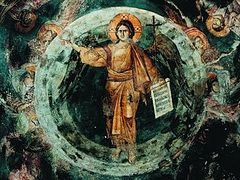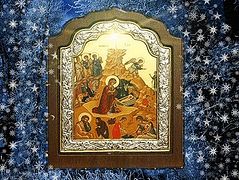In the name of the Father, and of the Son, and of the Holy Spirit.
When my children were little, even though they were too young to be fasting in any strict sense, from very early ages we gave them some idea of fasting by at least having them abstain from non-Lenten food—things like ice cream, cake, candy, and such when it was a fast day. When they were children, they would refer to these as “pink days”, because a fast day is colored pink on the calendar. They’d ask, “Is it a pink day?” I would answer, “No, it’s not a pink day”, or “yes, it is a pink day.”
On one occasion, my children were at my mother and father-in-law’s home, and my mother-in-law offered them some ice cream. My wife said, “No, it’s a pink day.” And she pointed to a calendar on the wall that my father-in-law had. It was a calendar where each day had one page, and you would tear it off as each day would pass. She pointed to it and said, “See, it’s a Wednesday”. My daughter got up on a chair and started to try to pull that page off to make it a Thursday so she could have some ice cream. My wife told her, “I’m sorry, but that doesn’t change the fact that it’s still Wednesday.” But the idea that there’s a time to fast and that there’s an appropriate level of fasting is an important thing for us to understand as Orthodox Christians.
In the weekday lectionary readings we’ve been reading the Gospel of St. Mark, and in chapter two we first find the account of the calling of St. Matthew, or Levi (his Hebrew name), as he’s referred to by Christ in the Gospel of Mark. St. Matthew was a tax-collector; Christ came to his home and ate with him—something that was very shocking to the Pharisees and also even to the disciples or St. John the Baptist. And so, we’re told that they came to Christ, and that the disciples of John and the Pharisees used to fast. They asked Him, Why do we and the Pharisees fast oft, but thy disciples fast not? (Mt. 9:14). We see that even St. John the Baptist’s disciples—although St. John the Baptist was the forerunner of Christ and announced to his disciples that He is the Lamb of God—were apparently filled with some measure of envy. Perhaps they also didn’t understand, for by this time St. John the Baptist was already in prison, and they had probably increased whatever level of fasting they had maintained when they were with St. John, because they were praying for his safe delivery from prison. But Christ responds to this question with three illustrations. First he says, Can the children of the bridechamber fast, while the bridegroom is with them? As long as they have the bridegroom with them, they cannot fast. But the days will come, when the bridegroom shall be taken away from them, and then shall they fast in those days (Mk. 2:19-20).
We know from the Gospel Christ that fasted While He was with His disciples. He also taught his disciples about fasting, but the disciples themselves did not fast—at least not to the extent that they would later on. But when we read in the book of Acts and the writings of the Early Church, we find that fasting was a very important part of the life of the Early Church; however, the disciples were not fasting like that when Christ was with them. This was because it was not the right time; it was a time of joy for them to have Christ bodily present with them. But one thing that this does tell us is that when Christ’s earthly ministry was over, Christians were to fast.
Fasting is an essential aspect of the Christian life, and it is one thing that, unfortunately, is becoming for the majority of Christians in the world an increasingly foreign concept. The Roman Catholic church has at least some idea of fasting, although it’s very diminished from the practice of the Early Church. But for Protestants, fasting is a very arbitrary thing—it’s something you do if you feel “led” to do it. Well, most Protestants I knew when I was a Protestant never felt “led” to fast. It’s amazing, but it just never happened! There were some who did practice fasting because they would read in the Bible that it ought to have some role in their spiritual life, so I don’t want to give you the impression that it never happened; however it certainly was not a common thing. But regular fasting is something that should be the mark of a Christian believer, if we believe what the Bible tells us.
The second image that Christ uses is: No man putteth a piece of new cloth unto an old garment, for that which is put in to fill it up taketh from the garment, and the rent is made worse (Mt. 9:16). In other words, you have a garment. It’s an old garment, with a hole. If you sow onto it a brand new piece of cloth that’s not been shrunk, what’s going to happen when you wash it, with time? That new piece is going to tear up the old and you’re going to have a bigger hole than you started off with. It’s not going to work. As the fathers explain, this means that the disciples were like old garments, because they had not yet been renewed by the Spirit. And fasting is like that new cloth, which in this case would be used to patch up an old tear in a garment. However, the tear here represents the wounds of sins in our soul. But because the disciples were not yet ready for it, this patch not only would not improve their spiritual condition, it would make it worse.
Then He uses a third image. He says, And no man putteth new wine into old wineskins; else the new wine will burst the wineskins, and be spilled, and the wineskins shall perish. But new wine must be put into new wineskins… (Lk. 5:38). When St. John Chrysostom comments on this, he talks about the need for appropriate remedies. It’s interesting that he uses the image or example of a woman who is very worldly, focused on her appearance, and likes to wear lots of makeup, jewelry, and fine clothes. He says (and this would happen even in Chrysostom’s time), “Now someone will say, ‘Why are you picking on women?’” He tries to explain that he’s just using this as an example—I won’t even try to use that as an example in our time, because we’re far less tolerant of such things—so I’ll use a different example. Let’s say you had a man who was very worldly, who lived in luxury, and you decided that the remedy for this man would be to send him off to Mt. Athos as a monk, that that will fix all of his problems, because he’ll get away from all of the temptations and sins that he’s fallen into. Do you think that kind of a remedy would work on such a person? The answer is obviously no, because you can’t go from living a life of ease and pleasure in the world, living only for yourself, a life of sin, and then resorting to such an extreme remedy. There would be no benefit. You have to work gradually, begin small and work your way up; and mainly you first have to become a Christian.
The asceticism of Christian life is not for nonbelievers—it would be of absolutely no spiritual benefit to a nonbeliever who tries to do these things. He might learn to master such practices on a physical endurance level, but it wouldn’t be of any spiritual benefit. And when we become Christians, we are like newborn babes. Perhaps you’re not a brand new Christian, perhaps you were baptized as a child but you never took your faith seriously. Now God has worked on your heart and you’ve decided you want to live a Christian life, you want to step up to the plate. Well, even though you’re not a new Christian in the sense that you were just baptized last week, you’re still in the same boat as a new convert because you’ve reconverted, you’ve embraced the Gospel—and so you’re like a newborn babe. You’re like my daughter Catherine who was old enough to understand that she couldn’t have ice cream on a pink day, but she wasn’t old enough to go to Mt. Athos or some other monastery and start trying to live a rigorous, ascetic life. You’ve got to start small and work your way up.
When Christ taught about fasting on the Sermon of the Mount, He said, Moreover, when ye fast… (Mt. 6:16). He didn’t say, “Moreover, if you fast”, or “if you feel like fasting”. He said, “when you fast”. Fasting is something that should be a part of our Christian life. If our health prevents it, obviously we’re not required to fast strictly; but you can at least abstain from ice cream like a two year old can if you have a health problem that prevents you from keeping the fast strictly. You can keep it on some level. I’m often asked if a pregnant woman should keep the fast strictly, and I repeat the wise words of Matushka Anne. She’s not a desert father or anything like that, but I think her words make perfect sense. She said that fasting is for the humbling of the flesh; when you’re pregnant, your flesh is already humbled, and so you don’t have to fast in a strict sense when you’re pregnant. But regardless of our condition we can all fast on some level. We shouldn’t do it arbitrarily. It’s a discipline, and it’s a discipline that we should enter into as a Church. We don’t all fast on the same level and we shouldn’t concern ourselves with how someone else is keeping the fast, but we should do it together. The fathers called fasting and almsgiving the two wings of prayer; and so if we want our prayers to be heard, if we want to grow as Christians, if we want to draw closer to Christ, the Heavenly Bridegroom, we have to fast now and cleanse ourselves of all impurity, so that we can finally enter into the eternal time of joy when we are with Him forever. Amen.





